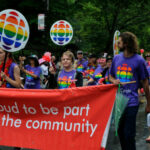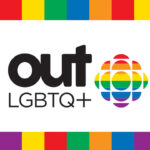Blog Post
CBC host pushes Toronto librarian to cancel feminist event over her belief that biological men should not be allowed in girls’ change rooms
By Jonathon Van Maren
Many of you may recall the controversy with Megan Murphy, the Vancouver feminist who was kicked off Twitter for her refusal to refer to biological males by female pronouns. She runs a blog called The Feminist Current, and has long been a stalwart defender of feminist values (we actually attended Simon Fraser University at the same time.) Needless to say, I disagree with her on nearly everything (most notably abortion), and thus it is all the more surprising that I find myself on the same side as Murphy on the transgender issue.
Murphy is the sort of feminist who believes that female spaces should be for biological females, and that allowing biological males who identify as females is dangerous. Women and girls need these spaces, she has pointed out, and often feel incredibly unsafe if a biological male is in their locker room, bathroom, or other private space—especially since many of these biological males are still in possession of male genitals. In Canada in 2019, this view, which would have been considered obvious about fifteen minutes ago, apparently renders her an irredeemable bigot, and she has since run directly into the tolerance buzz saw.
Murphy is scheduled to appear on a panel to discuss a range of feminist issues at the Toronto Public Library, and to put a stop to this, the transgender lobby has launched another jihad against her, attempting to get her de-platformed or, if that fails, have the event cancelled entirely. This effort is being supported by writers like Tabatha Southey of Maclean’s, who consistently writes some of the most unreadable drivel available in any Canadian publication, and this effort has also been endorsed by Toronto Mayor John Tory.
To discuss this ridiculous controversy, CBC host Carol Off had Vickery Bowles, the city librarian for the Toronto Public Library, on her show As it Happens. It was a brutal conversation. As Bowles calmly laid out the rationale for freedom of speech, Off browbeat her, insinuated that the event would harm transgender people, and basically begged her to cancel the event. A host on a taxpayer-funded state broadcaster spent an entire interview insinuating that a feminist speaker was beyond the pale—even implying that Murphy was akin to a neo-Nazi at one point.
Read this exchange between Off and Bowles. It perfectly encapsulates just how far the Overton Window has shifted, and just how far we’ve moved away from any semblance of sanity in this country: A librarian being berated for allowing a liberal, pro-choice feminist who doesn’t think men with penises should be allowed in girls’ change rooms speak on a panel. These people do not want a discussion. They do not want a debate. They want to silence anyone who still believes in basic biology and refuses to kowtow to an ideology most of them hadn’t even heard of just a few years ago.
Did you know that Megan Murphy would be part of this panel before you rented the space?
Absolutely, we knew that.
And you knew that Ms. Murphy has argued that trans women should not be allowed into women’s locker rooms … bathrooms or prisons, and that allowing people to self-declare their legal gender will “nullify women’s rights.” You knew all of that?
Yes, we did. We were well aware of the Vancouver Public Library controversy, where Meghan Murphy was allowed to speak. There’s actually a YouTube video of that event, which we reviewed.
And the room rental purpose was to have an educational and open discussion on the concept of gender identity and its legislation ramifications on women in Canada.
The purpose of this — to look at what does it mean for society, the law and women — it wasn’t an educational session, was it? This is someone who says that these rights should not exist, is that not the case?
Well, it’s a discussion. It’s part of a civil discourse that people are having in the larger community about gender identity.
What is that discussion? What are the two sides of that discussion?
We are a democratic institution and we are standing up for free speech. That’s what I’m standing up for. I’m not getting into a discussion about the two sides of this issue, or the three sides of this issue, or the four sides of this issue.
But if you have somebody within that discussion who denies that these rights should exist … is that really a side? Or is that denying somebody their rights?
People in the community, on social media, have been describing this as hate speech. It’s not defined under the Canadian Charter of Rights and Freedoms … as a hate speech. Otherwise, Megan Murphy would not be allowed to speak about these things. She would be facing criminal charges. But she’s not.
Sometimes … when you’re defending free speech, you’re in a very uncomfortable position where you’re defending perspectives and ideas and viewpoints that many in the community, or a few in the community, whatever, find offensive.
But it’s at that time that it’s most important to stand up for free speech. That is what makes Canada a democratic country, and that is what we need today more than ever.
Sometimes what we call free speech is hurtful speech. And we have a situation, as you know, the numbers are that about 20 per cent of trans people [in Ontario] have been physically or sexually assaulted due to their identity [according to the Canadian Mental Health Association.] Even more have been verbally threatened or harassed. So how do you safeguard them physically and their rights, if you feel that it’s within others’ rights to express ideas that deny those people their rights?
I am committed, and the library is committed, to offering safe and welcoming space for everyone, including members of the trans community.
But as a public library and as a public institution, we have an obligation to stand up for our democratic values and principles, and that free speech is something that protects everyone.
But it really — and I really need to emphasize this — it really protects the marginalized voices in our society. And if it wasn’t for free speech, those marginalized voices would not be heard.
But you also have within your policy that the library reserves right to deny or cancel a booking “that is likely to promote, would have the effect of promoting discrimination, contempt or hatred for any group or person.” Do you think that that is not what was happening here?
There is a very high bar for establishing what is hate speech in this country. It is established in the Criminal Code of Canada, and that bar is very high to allow free speech to flourish.
You think someone has to be charged criminally before you would not allow them to speak in your facilities?
We use the same principles in making decisions about room bookings as we do for our collections, Carol. We have a broad diversity of information and ideas and perspectives that are represented in all the books in our collections, and some of those ideas and perspectives people would find hurtful and painful.
But we’re not going to remove those books from our collection. And we are not going to eliminate programs from our branches that are controversial. And we’re not going to shut down room bookings because the speaker in the room booking has controversial ideas.
Are there any limits to who you would rent the space? I mean, would a Holocaust denier or a white supremacist be able to speak at one of your facilities?
You may recall we had a neo-Nazi group a few years ago rent one of our facilities and we allowed it. And that was for a memorial service. It was based on the purpose of booking.
If the purpose of the booking is going to result in hate speech or a discussion about hate speech, then no, we will not allow it.
Library workers, the union workers, they are very upset about this. They say that the staff has worked very hard to build trust in the community, to create a safe and inclusive space for everyone who uses it, and they feel that this is very damaging to that. What do you say to your own workers?
This is about free speech and, you know, I think that it’s important to understand that when you’re defending free speech, as a democratic institution that the library is, there are times when there are people in that community who are not happy with it, which is certainly the situation we find ourselves in right now with the decisions that we make.
There are limits to free speech. I’m sure you know that. And when free speech is hurtful or harmful to others, it is something that is shutting down the free speech of others. I’m sure you’ve heard that argument before.
Yes, I have.
And you don’t agree, obviously.
No, I don’t. I think that free speech is important, especially … when people are trying to shut down marginalized groups.
The marginalized groups being those who would deny the rights of those trans people, who are feeling this is hurtful. So what about those minority rights? What consideration are you giving to those minority rights?
We’re giving everyone consideration in this situation.
How do you think a trans person … would feel sitting in the room with this panel discussion? Do you think that they would feel safe?
We’ve heard from trans people and other people who are very supportive of us. But they don’t want their voices to be out there. They asked us to keep it in confidence and keep their communication to us in confidence, because they just don’t want reprisal on social media.
And I think that speaks to the fact that this is the controversy that needs to be discussed. I think it’s a controversy that needs to be out there in the public realm.
The mayor of Toronto believes in free speech, but he has asked you to not hold this event. Will you reconsider?
I’m not going to reconsider … supporting free speech.








